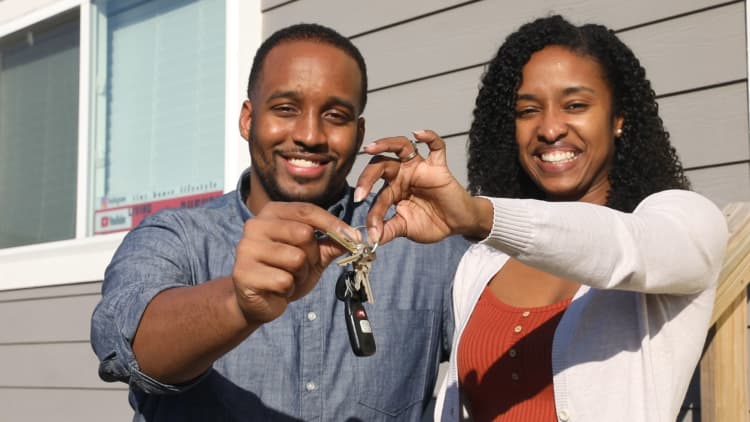Nearly 36.5 million Americans have filed for unemployment since mid-March, and for many, the process of filing for benefits has been fraught with confusion, system crashes and delays.
The experience can be even more complex for workers who have more than one job or income stream impacted by the economic upheaval of the pandemic. According to the Bureau of Labor Statistics, 5.1% of workers over the age of 16, or more than 8 million people, held more than one job in 2019. By some estimates, more than half of U.S. millennial workers have a side hustle to bring in additional income, whether that's starting their own business outside of their day job or selling goods and services online.
The coronavirus stimulus bill expands unemployment eligibility to workers who were previously ineligible, including roughly 16 million Americans who are self-employed, independent contractors, freelancers and gig workers, further complicating what kind of work lost to the pandemic is eligible for wage replacement.
Here's what happens to your unemployment eligibility if you have more than one job.
If you have two jobs but lose one
If your working hours are reduced in any way, including if you hold several jobs and you're laid off from one, you may qualify for partial unemployment, says Michele Evermore, senior policy analyst at the National Employment Law Project.
Eligibility will vary by state, and your benefit amount will be based on the amount of work you lose as well as the earnings you're still bringing in each week. Workers earning partial unemployment are also eligible to receive the weekly $600 federal benefit laid out in the coronavirus relief bill.
Many states award partial unemployment benefits based on your hours worked. However, some, like New York, base your benefit amount on the number of days worked during the week. This could impact how you schedule shifts at your remaining job, such as choosing to work longer shifts on fewer days versus spreading hours throughout the week.
If you lose your job but have a side gig
You'll qualify for unemployment if you lose your job through no fault of your own and will receive benefits based on your previous wages. If you're still bringing in income through a side hustle, such as by building websites for clients through Fiverr or selling through your Etsy shop, you'll need to include that when you certify your weekly benefits with your state unemployment office.
Evermore tells CNBC Make It that any taxable earnings, including those made from independent contract or freelance work, will be considered in your unemployment filings. What you make from your side gigs can lower the amount you receive from unemployment that week, or it could deem you ineligible for benefits for the week entirely. Many states allow you to earn up to a certain percentage of your benefit amount through other work, before your payment is reduced.
Failure to report income is classified as unemployment insurance fraud. Consequences vary by state and can include having to pay back benefits plus interest, penalty fees, ineligibility for future benefits and criminal prosecution.

If you still have your job but lose money from a side gig
Under the stimulus bill's Pandemic Unemployment Assistance (PUA) program, workers previously ineligible for benefits, such as the self-employed, can receive unemployment aid for up to 39 weeks, as well as $600 per week until July 31 if they lose work due to the pandemic.
But, if you qualify for traditional unemployment through a job you still have, you won't qualify for PUA for lost income from a side hustle.
For example, let's say you're able to continue working your day job from home. However, the earnings you make driving for Uber, which actually make up the majority of your income, have vanished during the pandemic.
Because you still have your W-2 job with an employer, you won't qualify for any unemployment aid.
"That's a huge problem for people," Evermore says. According to a 2019 Bankrate survey, three out of every 10 American workers who take on a side hustle say they need that second job to make ends meet.
"I'm seeing this a lot with actors or entertainers," Evermore adds. These workers might earn the majority of their income through 1099 contract work, but they may also take on a food industry job for steadier hours. Now that many are being called back to work, likely to fewer hours and tips, they are considered employed and therefore ineligible for traditional benefits as well as new benefits under the stimulus bill.
Individuals aren't eligible for unemployment if they refuse suitable work, and neither a general fear of exposure to the virus nor earning more from benefits than what one would earn back at work are grounds for refusal.
If you have rental income coming in
In general, if you rent out a single property as a form of passive income and it's not tied to your employment (for example, you own your home and rent out one room), you likely won't be required to include incoming rent when you report the wages you earn on your weekly filings.
This can vary by state, however, and Evermore recommends you check with your state unemployment agency for more details.
That also means if you lose rental income because your tenant can't make rent that month, you won't be able to recover some of those funds through unemployment assistance.
"That's more like investment loss," Evermore says. "My 401(k) could be doing great or it could be tanking, but that has nothing to do with my employment situation."
Check out: The best credit cards of 2020 could earn you over $1,000 in 5 years
Don't miss:



